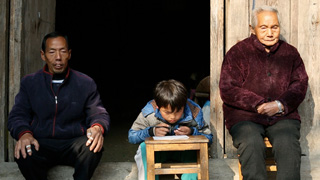Gone
 CHINA, GERMANY / 2015 / Chinese / Color / Blu-ray / 78 min
CHINA, GERMANY / 2015 / Chinese / Color / Blu-ray / 78 min
Director, Script, Photography, Editing, Producer, Source: Jin Xingzheng
The elementary schools once found all over China in the 1960s have been badly affected by the one-child policy, closing one by one in the 1990s. In villages where old school buildings stand deserted, children rattle down the mountain in buses to distant elementary schools. One farmer tells how hard it is to make a living just cultivating tea. A family in which the mother has left home for work senses the end of a way of life. The daily operation of a school in Zhejiang Province’s mountainous central region and the stories of people living in the depopulating countryside reveal the harsh realities faced by China’s rural farming communities.
[Director’s Statement] In 2012, I worked as a volunteer educator in a village in the mountains of Zhejiang Province. To my surprise I found that many of the schools in the region had been shut down, and had either been abandoned or turned into facilities for the elderly. I learned that the majority of such schools had been built in the 1960s, and shared similar architecture. It was the eve of the Cultural Revolution, and the motto “The more people there are, the stronger we are” advanced in the Mao Zedong era had led to a sudden spike in the birthrate and the building of more and more schools in the villages. When the government began implementing its one-child policy in the 1980s, however, the birthrate took a steep dive. The Reform and Opening Up policy led to exponential growth of the Chinese economy, and many people left the countryside to work in the cities, forcing the closure of schools in rural communities.
Langke Central Primary School is the last primary school running in its village. First started in 1929, the school building was rebuilt in the 1990s. There were over 260 students enrolled at the time, but by 2012 the number had dwindled to thirty-one, and by 2014, down to two. Its 2015 closing leaves the community devoid of schools. The village itself will be empty of people in the near future, and local farming traditions that lasted several thousands of years will be lost.
The one-child policy adopted by the government to curb population growth may have allowed China to contribute globally, but it brought burdens and misfortune to its many farming families. The ratio between the sexes grew lopsided, resulting in farming villages “buying” brides to create families. The families of Qiu Luhong and Zhu Ziyan, who appear in the film, give us pause—for we see the futures of many ordinary people had been sacrificed for the policy of the state.
The film is a record of the transition that a school in a mountain village underwent. By following the dwindling of student numbers and changes in the community’s very existence, I hope I have captured the excessive emotional pain this generation has been made to experience. We may not be able to control how history unfolds, but we do have the ability to record it as it happens.
 Jin Xingzheng
Jin Xingzheng
Jin Xingzheng studied graphic design at Gongshang University in Hangzhou and then went on to study media arts, first at Tama Art University in Tokyo, and later at Berlin University of the Arts. His films include Shuai Jun’s Childhood (2010), official selection at Brno Sixteen in the Czech Republic and Forum Doc in Belo Horizonte, Brazil; The Promoter (2011), The Birth (2014), official selection at the Contravision International Film Festival in Berlin; and A Village (2014). Gone, which was officially selected in 2015 for both the Freiburg Film Forum and the Marseille International Film Festival, was completed as his thesis project at Berlin University of the Arts.
